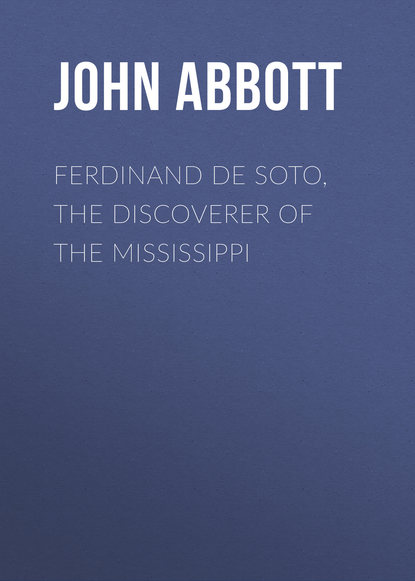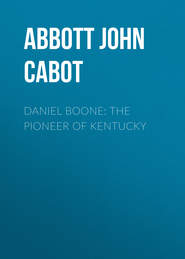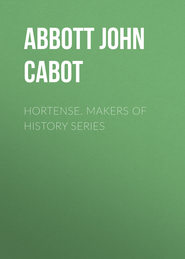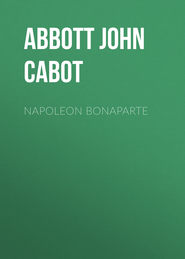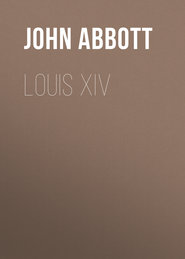По всем вопросам обращайтесь на: info@litportal.ru
(©) 2003-2024.
✖
Ferdinand De Soto, The Discoverer of the Mississippi
Настройки чтения
Размер шрифта
Высота строк
Поля
"It will be best first," said they, "to assemble all the warriors of our nation, for these men are well armed. In the meantime, let us pretend friendship and not provoke an attack until we are strong enough to be sure of victory."
The irascible old chief was willing only partially to listen to this advice. He delayed the conflict, but did not disguise his hostility. De Soto sent to him a very friendly message, declaring that he came in peace and wished only for an unmolested march through his country. The Cacique returned an angry reply, refusing all courteous intercourse.
The Spaniards had been but three hours in the village when, to their surprise, they perceived an army of four thousand warriors, thoroughly prepared for battle, gathered around the mound upon which was reared the dwelling of the chief. If so many warriors could be assembled in so short a time, they feared there must be a large number in reserve who could be soon drawn in. The Spaniards, in their long marches and many battles, had dwindled away to less than five hundred men. Four thousand against five hundred were fearful odds; and yet the number of their foes might speedily be doubled or even quadrupled. In addition to this, the plains around the city were exceedingly unfavorable for the movements of the Spanish army, while they presented great advantages to the nimble-footed natives, for the region was covered with forests, sluggish streams and bogs.
By great exertions, De Soto succeeded in effecting a sort of compromise. The Cacique consented to allow the Spaniards to remain for six days in the village to nurse the sick and the wounded. Food was to be furnished them by the Cacique. At the end of six days the Spaniards were to leave, abstaining entirely from pillage, from injuring the crops, and from all other acts of violence.
The Cacique and all the inhabitants of the village abandoned the place, leaving it to the sole occupancy of the Spaniards. April, in that sunny clime, was mild as genial summer. The natives, with their simple habits, probably found little inconvenience in encamping in the groves around. On the last day of his stay, De Soto obtained permission to visit the Cacique. He thanked the chief cordially for his kindness and hospitality, and taking an affectionate leave, continued his journey into the unknown regions beyond.
Ascending the tortuous windings of the river on the eastern bank, the Spaniards found themselves, for four days, in almost impenetrable thickets, where there were no signs of inhabitants. At length they came to quite an opening in the forest. A treeless plain, waving with grass, spread far and wide around them. The Mississippi river here was about half a league in width. On the opposite bank large numbers of Indians were seen, many of them warriors in battle array, while a fleet of canoes lined the shore.
De Soto decided, for some unexplained reason, to cross the river at that point, though it was evident that the Indians had in some way received tidings of his approach, and were assembled there to dispute his passage. The natives could easily cross the river in their canoes, but they would hardly venture to attack the Spaniards upon the open plain, where there was such a fine opportunity for the charges of their cavalry.
Here De Soto encamped for twenty days, while all who could handle tools were employed in building four large flat boats for the transportation of the troops across the stream. On the second day of the encampment, several natives from some tribe disposed to be friendly, on the eastern side of the river, visited the Spaniards. With very much ceremony of bowing and semi-barbaric parade, they approached De Soto, and informed him that they were commissioned by their chief to bid him welcome to his territory, and to assure him of his friendly services. De Soto, much gratified by this message, received the envoys with the greatest kindness, and dismissed them highly pleased with their reception.
Though this chief sent De Soto repeated messages of kindness, he did not himself visit the Spanish camp, the alleged reason being, and perhaps the true one, that he was on a sick bed. He, however, sent large numbers of his subjects with supplies of food, and to assist the Spaniards in drawing the timber to construct their barges. The hostile Indians on the opposite bank frequently crossed in their canoes, and attacking small bands of workmen, showered upon them volleys of arrows, and fled again to their boats.
One day the Spaniards, while at work, saw two hundred canoes filled with natives, in one united squadron, descending the river. It was a beautiful sight to witness this fleet, crowded with decorated and plumed warriors, their paddles, ornaments, and burnished weapons flashing in the sunlight. They came in true military style: several warriors standing at the bows and stern of each boat, with large shields of buffalo hides on their left arms, and with bows and arrows in their hands. De Soto advanced to the shore to meet them, where he stood surrounded by his staff. The royal barge containing the chief was paddled within a few rods of the bank. The Cacique then rose, and addressed De Soto in words which were translated by the interpreter as follows:
"I am informed that you are the envoy of the most powerful monarch on the globe. I have come to proffer to you friendship and homage, and to assure you of my assistance in any way in which I can be of service."
De Soto thanked him heartily for his offers, and entreated him to land, assuring him he should meet only the kindest reception. The following extraordinary account of the termination of this interview, a termination which seems incredible, is given in the "Conquest of Florida:"
"The Cacique returned no answer, but sent three canoes on shore with presents of fruit, and bread made of the pulp of a certain kind of plum. The Governor again importuned the savage to land, but perceiving him to hesitate, and suspecting a treacherous and hostile intent, marshalled his men in order of battle. Upon this the Indians turned their prows and fled.
"The cross-bowmen sent a flight of arrows after them, and killed five or six of their number. They retreated in good order, covering the rowers with their shields. Several times after this they landed to attack the soldiers, as was supposed, but the moment the Spaniards charged upon them they fled to their canoes."
If this account be true, the attack by the Spaniards was as inexcusable as it was senseless. At the end of twenty days the four barges were built and launched. In the darkness of the night De Soto ordered them to be well manned with rowers and picked troops of tried prudence and courage. The moment the bows touched the beach the soldiers sprang ashore, to their surprise encountering no resistance. The boats immediately returned for another load. Rapidly they passed to and fro, and before the sun went down at the close of that day, the whole army was transported to the western bank of the Mississippi. The point where De Soto and his army crossed, it is supposed, was at what is called the lowest Chickasaw Bluff.
"The river in this place," says the Portuguese Narrative, "was a mile and a half in breadth, so that a man standing still could scarcely be discerned from the opposite shore. It was of great depth, of wonderful rapidity, and very turbid, and was always filled with floating trees and timber, carried down by the force of the current."
The army having all crossed, the boats were broken up, as usual, to preserve the nails. It would seem that the hostile Indians had all vanished, for the Spaniards advanced four days in a westerly direction, through an uninhabited wilderness, encountering no opposition. On the fifth day they toiled up a heavy swell of land, from whose summit they discerned, in a valley on the other side, a large village of about four hundred dwellings. It was situated on the fertile banks of a stream, which is supposed to have been the St. Francis.
The extended valley, watered by this river, presented a lovely view as far as the eye could reach, with luxuriant fields of Indian corn and with groves of fruit trees. The natives had received some intimation of the approach of the Spaniards, and in friendly crowds gathered around them, offering food and the occupancy of their houses. Two of the highest chieftains, subordinate to the Cacique, soon came with an imposing train of warriors, bearing a welcome from their chief and the offer of his services.
De Soto received them with the utmost courtesy, and in the interchange of these friendly offices, both Spaniards and natives became alike pleased with each other. The adventurers remained in this village for six days, finding abundant food for themselves and their horses, and experiencing in the friendship and hospitality of the natives, joys which certainly never were found in the horrors of war. The province was called by the name of Kaska, and was probably the same as that occupied by the Kaskaskias Indians.
Upon commencing anew their march they passed through a populous and well cultivated country, where peace, prosperity and abundance seemed to reign. In two days, having journeyed about twenty miles up the western bank of the Mississippi, they approached the chief town of the province where the Cacique lived. It was situated, as is supposed, in the region now called Little Prairie, in the extreme southern part of the State of Missouri, not far from New Madrid. Here they found the hospitable hands of the Cacique and his people extended to greet them.
The residence of the chief stood upon a broad artificial mound, sufficiently capacious for twelve or thirteen houses, which were occupied by his numerous family and attendants. He made De Soto a present of a rich fur mantle, and invited him, with his suite, to occupy the royal dwellings for their residence. De Soto politely declined this offer, as he was unwilling thus to incommode his kind entertainer. He, however, accepted the accommodation of several houses in the village. The remainder of the army were lodged in exceedingly pleasant bowers, skilfully, and very expeditiously constructed by the natives, of bark and the green boughs of trees, outside the village.
It was now the month of May. The weather was intensely hot, and these rustic bowers were found to be refreshingly cool and grateful. The name of this friendly chief was Casquin. Here the army remained for three days, without a ripple of unfriendly feeling arising between the Spaniards and the natives.
It was a season of unusual drouth in the country, and on the fourth day the following extraordinary incident occurred: Casquin, accompanied by quite an imposing retinue of his most distinguished men, came into the presence of De Soto, and stepping forward, with great solemnity of manner, said to him, —
"Señor, as you are superior to us in prowess and surpass us in arms, we likewise believe that your God is better than our God. These you behold before you are the chief warriors of my dominions. We supplicate you to pray to your God to send us rain, for our fields are parched for the want of water."
De Soto, who was a reflective man, of pensive temperament and devoutly inclined, responded, —
"We are all alike sinners, but we will pray to God, the Father of mercies, to show his kindness to you."
He then ordered the carpenter to cut down one of the tallest pine trees in the vicinity. It was carefully trimmed and formed into a perfect, but gigantic cross. Its dimensions were such, that it required the strength of one hundred men to raise and plant it in the ground. Two days were employed in this operation. The cross stood upon a bluff, on the western bank of the Mississippi. The next morning after it was reared, the whole Spanish army was called out to celebrate the erection of the cross, by a solemn religious procession. A large number of the natives, with apparent devoutness, joined in the festival.
Casquin and De Soto took the lead, walking side by side. The Spanish soldiers and the native warriors, composing a procession of more than a thousand persons, walked harmoniously along as brothers, to commemorate the erection of the cross – the symbol of the Christian's faith. The Cross! It should be the emblem of peace on earth and good will among men. Alas! how often has it been the badge of cruelty and crime.
The priests, for there were several in the army, chanted their Christian hymns, and offered fervent prayers. The Mississippi at this point is not very broad, and it is said that upon the opposite bank twenty thousand natives were assembled, watching with intensest interest the imposing ceremony, and apparently, at times, taking part in the exercises. When the priests raised their hands in prayer, they, too, extended their arms and raised their eyes, as if imploring the aid of the God of heaven and of earth.
Occasionally a low moan was heard wafted across the river – a wailing cry, as if woe-stricken children were imploring the aid of an Almighty Father. The spirit of De Soto was deeply moved to tenderness and sympathy as he witnessed this benighted people paying such homage to the emblem of man's redemption. After several prayers were offered, the whole procession, slowly advancing two by two, knelt before the cross, as in brief ejaculatory prayer, and kissed it. All then returned with the same solemnity to the village, the priests chanting the grand anthem, "Te Deum Laudamus."
Thus more than three hundred years ago the cross, significant of the religion of Jesus, was planted upon the banks of the Mississippi, and the melody of Christian hymns was wafted across the silent waters, and was blended with the sighing of the breeze through the tree-tops. It is sad to reflect how little of the spirit of that religion has since been manifested in those realms in man's treatment of his brother man.
It is worthy of especial notice that upon the night succeeding this eventful day clouds gathered, and the long-looked-for rain fell abundantly. The devout Las Casas writes:
"God, in his mercy, willing to show these heathen that he listeneth to those who call upon him in truth, sent down, in the middle of the ensuing night, a plenteous rain, to the great joy of the Indians."
CHAPTER XVIII
Vagrant Wanderings
Trickery of Casquin. – The March to Capaha. – The Battle and its Results. – Friendly Relations with Capaha. – The Return Journey. – The Marsh Southward. – Salt Springs. – The Savages of Tula. – Their Ferocity. – Anecdote. – Despondency of De Soto.
It is painful to recall the mind from these peaceful, joy-giving, humanizing scenes of religion, to barbaric war – its crime, carnage, and misery. It is an affecting comment upon the fall of man, that far away in this wilderness, among these tribes that might so have blessed and cheered each other by fraternal love, war seems to have been the normal condition. After a residence of nine days in this village, beneath truly sunny skies, in the enjoyment of abundance, and cheered by fruits, flowers, and bird-songs, the Spanish army again commenced its march in the wild and apparently senseless search for gold.
The Cacique, Casquin, was about fifty years of age. He begged permission to accompany De Soto to the next province, with his whole army in its best military array, and with a numerous band of attendants to carry provisions and to gather wood and fodder for the encampments. De Soto cheerfully accepted this friendly offer. But he soon found that it was hatred, not love, which was the impelling motive; that the chief was incited by a desire to make war, not to cultivate peace. The chief of the next province was a redoubtable warrior named Capaha. His territories were extensive; his subjects numerous and martial. Time out of mind there had been warfare between these two provinces, the subjects of each hating each other implacably.
Capaha had in recent conflicts been quite the victor, and Casquin thought this a good opportunity, with the Spaniards for his powerful allies, to take signal vengeance upon his foe. Of this De Soto, at the time, knew nothing.
The army commenced its march. There were five thousand native warriors who accompanied him, plumed, painted, and armed in the highest style of savage art. There were three thousand attendants, who bore the supplies, and who were also armed with bows and arrows. Casquin, with his troops, took the lead; wishing, as he said, to clear the road of any obstructions, to drive off any lurking foes, and to prepare at night the ground for the comfortable encampment of the Spaniards. His troops were in a good state of military discipline, and marched in well organized array about a mile and a half in advance of the Spaniards.
Thus they travelled for three uneventful days, until they reached an immense swamp, extending back unknown miles from the Mississippi. This was the frontier line which bordered the hostile provinces of Casquin and Capaha. Crossing it with much difficulty, they encamped upon a beautiful prairie upon the northern side. A journey of two days through a sparsely inhabited country brought them to the more fertile and populous region of the new province. Here they found the capital of the Cacique. It was a well fortified town of about five hundred large houses, situated upon elevated land, which commanded an extensive view of the country around. One portion of the town was protected by a deep ditch, one hundred and fifty feet broad. The higher portion was defended by a strong palisade. The ditch, or canal, connected with the Mississippi river, which was nine miles distant.
Capaha, hearing suddenly of the arrival of so formidable a force, fled down the canal in a curve, to an island in the river, where he summoned his warriors to meet him as speedily as possible. Casquin, marching as usual a mile and a half in advance, finding the town unprotected, and almost abandoned, entered and immediately commenced all the ravages of savage warfare. One hundred men, women and children, caught in the place, were immediately seized, the men killed and scalped, the women and boys made captives. To gratify their vengeance, they broke into the mausoleum, held so sacred by the Indians, where the remains of all the great men of the tribe had been deposited. They broke open the coffins, scattered the remains over the floor and trampled them beneath their feet.
It is said that Casquin, would have set fire to the mausoleum, and laid it and the whole village in ashes, but that he feared that he might thus incur the anger of De Soto. When the Governor arrived and saw what ravages had been committed by those who had come as his companions, friends and allies, he was greatly distressed. Immediately he sent envoys to Capaha on the island, assuring him of his regret in view of the outrages; that neither he, nor his soldiers, had in the slightest degree participated in them, and that he sought only friendly relations with the Cacique.
Capaha, who was a proud warrior, and who had retired but for a little time that he might marshal his armies to take vengeance on the invaders, returned an indignant and defiant answer; declaring that he sought no peace; but that he would wage war to the last extremity.
Again De Soto found himself in what may be called a false position. The chief Capaha and his people were exasperated against him in the highest degree. The nation was one of the most numerous and powerful on the Mississippi. Should the eight thousand allies, who had accompanied him from Kaska, and who had plunged him into these difficulties, withdraw, he would be left entirely at the mercy of these fierce warriors. From ten to twenty thousand might rush upon his little band, now numbering but about four hundred, and their utter extermination could hardly be doubtful. Under these circumstances he decided to attempt to conquer a peace. Still he made other efforts, but in vain, to conciliate the justly enraged chieftain. He then prepared for war. However severely he may be censured for this decision, it is the duty of the impartial historian to state those facts which may in some degree modify the severity of judgment.
A large number of canoes were prepared, in which two hundred Spaniards and three thousand Indians embarked to attack Capaha upon his island, before he had time to collect a resistless force of warriors. They found the island covered with a dense forest, and the chief and his troops strongly intrenched. The battle was fought with great fury, the Spanish soldiers performing marvellous feats of bravery, strength and endurance. The warriors of Capaha, who fought with courage equal to that of the Spaniards, and struck such dismay into the more timid troops of Casquin, that they abandoned their allies and fled tumultuously to their canoes, and swiftly paddled away.
De Soto, thus left to bear the whole brunt of the hostile army, was also compelled to retreat. He did this in good order, and might have suffered terribly in the retreat but for the singular and, at the time, unaccountable fact that Capaha withdrew his warriors and allowed the Spaniards to embark unmolested. It would seem that the sagacious chieftain, impressed by the wonderful martial prowess displayed by the Spaniards, and by the reiterated proffers of peace and friendship which had been made to him, and despising the pusillanimity of the troops of Casquin, whom he had always been in the habit of conquering, thought that by detaching the Spaniards from them he could convert De Soto and his band into friends and allies. Then he could fall upon the Indian army, and glut his vengeance, by repaying them tenfold for all the outrages they had committed.
Accordingly, the next morning, four ambassadors of highest rank visited the Spanish encampment. De Soto and Casquin were together. The ambassadors bowed to De Soto with profound reverence, but disdainfully took no notice whatever of Casquin. The speaker then said, —
"We have come, in the name of our chief, to implore the oblivion of the past and to offer to you his friendship and homage."
De Soto was greatly relieved by the prospect of this termination of the difficulties in which he had found himself involved. He treated the envoys with great affability, reciprocated all their friendly utterances, and they returned to Capaha highly pleased with their reception.





